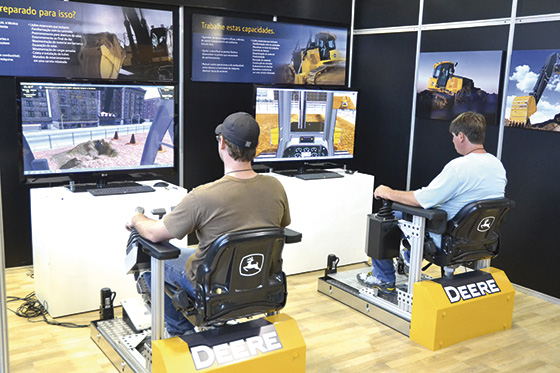Advanced interface

Simulators come into the construction industry as a quick and economic alternative to get operators skilled and to minimize the risk of accidents in worksites
Enabling operators was always a recurrent necessity for the construction industry. But recently—due to the more and more accelerated pace in the worksites—this subject reached a higher place in the list of priorities of medium and large companies.And during the last years this subject got a new dimension due to the development of virtual reality, a trend that is leading the industry, for example, to purchase simulators to qualify its labor and ensure higher safety to operators of heavy machines from the Yellow Line.“More than being modern and efficient, simulators reduce significantly the costs involved with operators’ training”,ensures Bernardo Uliana, application engineer of the GroupTracbel, expert in distribution, aftersales and service of heavy machines and equipment from the brandsVolvo CE, Clark, Massey Ferguson, Tigercat, Precision Husky and SP Maskiner, as well as for Michelin industrial tires. “It is an investment that gives returnand enables operators with features of last generation”, complements him.
In a way to reduce drastically the chronic problems of its clients and also to attend the Regulating Standard no12 (NR-12) of the Ministry of Labor, the company carried out heavy investments in a pioneer project of labor enabling through workshops along the whole country. In partnership with the Swedish company Oryx Simulations, Tracbel allocated three years ago R$ 550 thousand to the first project of advanced training with simulators. And due to the growing demand, the company also started to sell simulators of that brand in the whole country.
Equipped with high-resolution 3D graphic system of and with a platform of electric movements, the equipment was initially moved to the operation fieldof Volvo CEbrandclients.The positive results of the pilot project led the company to promote new cycles of investment.The group recently invested R$ 5 millionto expand the project, making available to the clients two models of simulators for articulated trucks, four for excavators, two for loaders and two for dump trucks. “We had already trained more than 1500 operators since the first pilot programof this project”, commentsUliana. “In spite of the crisis, this was an excellent year, since many companies decided to invest in training programs. The deceleration of the industry stimulated the training of its operators.”
Currently, ten simulators of Tracbel travel through the country installed in trailers, trucks and containers.The idea is to improve technical formation with basic concepts of steering, signaling and maneuvering in “real” situations which accelerate the operator’s learning process. “Theprogram of operators’ training includes 40-hour modules with theoretical and practical lessons. The daily workload is of eight hours during the five working days of the week”, sums up the engineer.
In Uliana’s point of view, the use of simulators in the workplaces is fundamental to train operators safely. And what was just an international trend is already a local reality. The executive emphasizes that currently it is not possible for a person to come into and operate heavy equipment without previous training on a simulator. “The simulator allows operators to practice and to correct their failures”, emphasizes him. “Therefore, this training tool is essential not only to increase productivity but also to ensure safety.”

Av. Francisco Matarazzo, 404 Cj. 701/703 Água Branca - CEP 05001-000 São Paulo/SP
Telefone (11) 3662-4159
© Sobratema. A reprodução do conteúdo total ou parcial é autorizada, desde que citada a fonte. Política de privacidade














